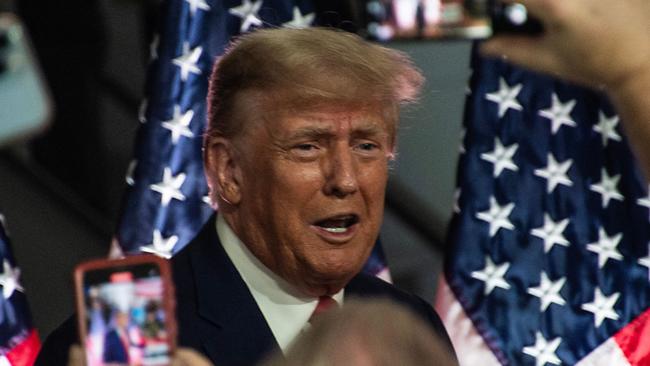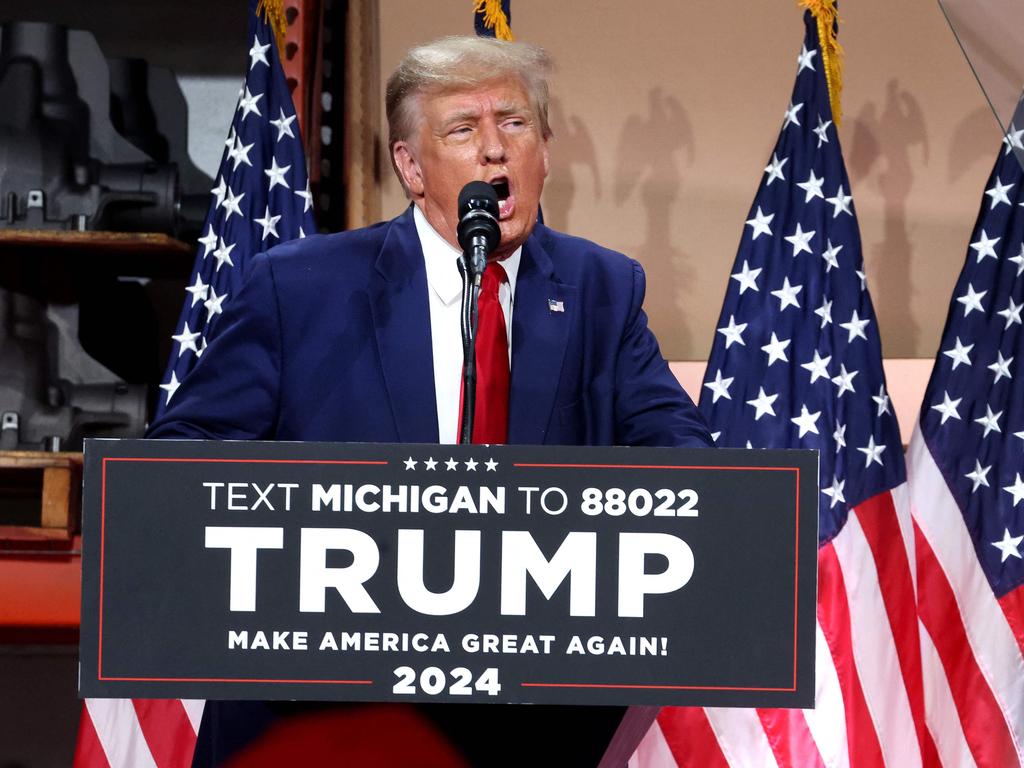American democracy in an age of despair
If the best the US can do is serve up Joe Biden and Donald Trump presidential candidates for the next election, God help us.

The 80-year-old Biden will celebrate another two birthdays before he starts a second term, assuming he wins again. Trump, 77, would be 82 by the end of a second term as president.
Biden is already the oldest president in US history. If Trump wins and serves a full term he’ll take over that mantle.
Yet a Biden v Trump showdown next year seems likely, if only because both major parties lack the courage to prevent such a lacklustre contest from eventuating. Democrats don’t appear willing to replace their President with someone such as California Governor Gavin Newsom or Transport Secretary and former presidential candidate Pete Buttigieg. Vice-President Kamala Harris could also run, but she hasn’t exactly covered herself in glory during this term and would struggle to defeat Trump.
On the Republican side, Nikki Haley is probably the best candidate in the race but, along with other hopes such as Ron DeSantis, Mike Pence and Vivek Ramaswamy, she has little chance of beating Trump in a primary.
Ever since charges started being laid against the former president, his popularity has soared, especially among Republican voters. Short of a legally precipitated downfall, it is hard to see Trump missing out on his party’s nomination. And if he squares off against an ageing Biden, a second Trump presidency is no longer a long shot. The latest polling has him well ahead of Biden, which has to be a concern for Democrats.
Neither Trump’s nor Biden’s age would be a concern if they were free of scandals and sharp of mind. However, you can’t say that about this pair. Four years ago, when Biden was surging as the Democratic frontrunner for president, those who zeroed in on his age and state of mind as reasons not to vote for him were playing a derogatory polemic game. It was spin on behalf of Trump because Biden was the perfect blend of experience and moderation to unseat Trump, which is exactly what he did. It was ageist.
But Biden’s cognitive decline since then has become a real issue. His public appearances are increasingly shaky. How he can run again with any sort of guarantee to serve out a full term is laughable. And with Harris confirmed as his running mate, expect Republican strategists to target her mercilessly on the campaign trail, substantially increasing the likelihood of a second Trump presidency.
Experience in leadership should be seen as a good thing. Closer to home, I would argue the lack of older Australians who continue to serve in our parliaments is a problem. Anthony Albanese only turned 60 this year, yet when he won last year’s federal election while still in his 50s he became the oldest opposition leader to win an election in Australian history.
There is nothing in principle wrong with experienced older politicians assuming leadership roles. Especially in the context of population ageing, whereby people are living and working longer.
That isn’t the issue in the US; it is who those ageing presidential options are. A nation of nearly 350 million people should be spoilt for choice when it comes to candidates, unconstrained from having to choose from within a parliament, as in Westminster systems when voting for prime ministers.
The times require bold leadership, yet across the Western world managerialism in politics prevents more than incremental reforms and populism risks candidates such as Trump winning out. The US primaries system, especially on the Republican side, favours populism, and appealing to the party base is often a winning strategy that polarises political debate and erodes the centre.
In the meantime, non-democracies continue to rise. China – notwithstanding economic setbacks of late – is moving further away from democratic ideals. The rise of India, once thought to be an important hedge against what a non-democratic China might become, may become a concern all on its own for democratic polities. India’s nationalist tendencies are moving the body politic closer to fascism than anyone should be comfortable with. Its commitment to pluralism has waned under the prime ministership of Narendra Modi, despite his rhetoric to the contrary. His government has preyed on religious divisions, using populism to great effect.
Nonetheless, India remains an important piece in the global democratic puzzle. But for its economic rise to be politically well constructed it needs to bear witness to well-functioning developed democracies in other countries, lest the temptation to drift takes over.
On a separate topic, we saw more evidence this week that support for the voice continues to wane ahead of the referendum vote on October 14. If the opinion polls are anywhere near accurate the vote will fail and Australia’s political class will need to start thinking about how it plans to progress reconciliation in the aftermath. It won’t be easy.
Defeat in the popular vote and in most states will represent a strong rejection of what was a signature election commitment from Labor and the Prime Minister, remembering Albanese used his final National Press Club address as opposition leader to champion the voice.
Those Yes campaigners who dealt their side blow after blow will likely use the result to brand the Australian mainstream as racist rather than reflect on their own contributory negligence. Equally, the No camp shouldn’t use its likely victory to pour scorn on opponents, and anti-voice Coalition MPs shouldn’t read the results as a broader rejection of Labor’s agenda. This week’s Newspoll confirmed that while the voice is unpopular, so is the opposition.
In truth, most No voters will have a heavy heart if the referendum fails, having only registered a conservative rejection of the proposition because of the lack of detail attached to it. That represents a tactical blunder by the Yes campaign rather than a portent to broader voter dissatisfaction with the government.
Peter van Onselen is a professor of politics and public policy at the University of Western Australia and Griffith University.








If the best the US can do is serve up Joe Biden and Donald Trump as the respective Democrat and Republican presidential candidates for the next election, God help us. Surely there are better alternatives. It wouldn’t be a case of generational change for its own sake: Biden and Trump are past their use-by dates.